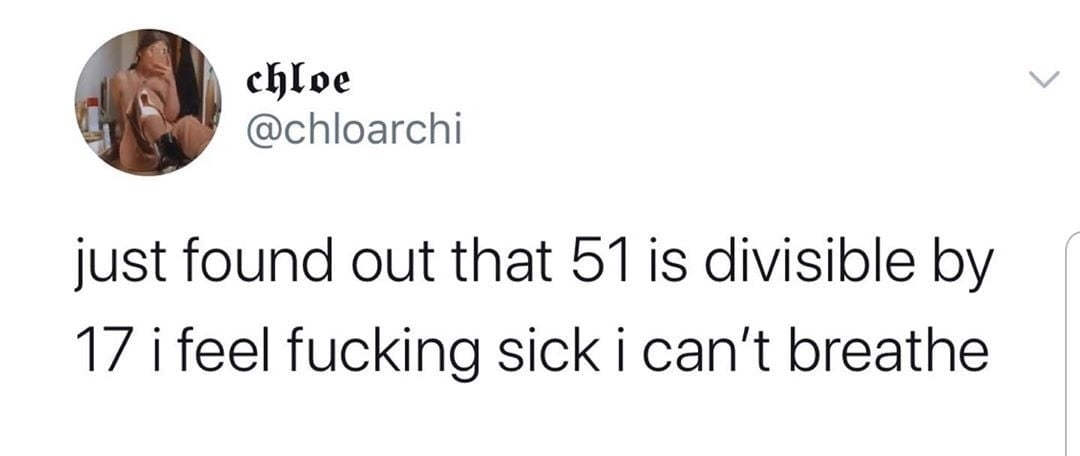Math(s)
-
51 --> 5+1 = 6, 6 is divisible by 3. This means that 51 is divisible by 3.
60 is divisible by 3, 60/3 = 20.
51 is 9 less than 60. 9 is divisible by 3. 9/3 = 3.
20 - 3 = 17.
-
Is this a real divisibility rule?
-
51 has to be the non-prime number that feels the most prime
-
Seeker of Carcosareplied to [email protected] last edited by
Divisibility by 3 rule is real. If the sum of the digits of a number is divisible by 3, then the number itself is also divisible by 3. Same goes with 9. There’s an 11 rule, but it’s a bit convoluted.
-
[email protected]replied to [email protected] last edited by
Someone’s never played darts, I see.
-
For me it’s Grothendieck's prime.
-
[email protected]replied to [email protected] last edited by
Yep. If the sun of the numbers is divisible by 3, the number is divisible by three.
Works great for 6 too, as if it's divisible by 3 and even, the number is divisible by 6.
And 9 is the same thing, but the sum has to be divisible by 9 (e.g. 12384 is divisible by 9 because the sum of the digits is 18, which is divisible by 9)
There's also good rules for 4 and 8 as well. If the last 2 digits are divisible by 4, the whole number is (e.g. 127924 is divisible by 4 because 24 is) and if the last 3 numbers are divisible by 8, the whole number is (e.g. 12709832 is divisible by 8 because 832 is.)
-
Only way I managed it to make sense is:
17 is 10 and 7
10 * 3 = 30
7 * 3 = 21
30 + 21 = 51
Phuu air. I can breath again. Don't do this to me.
-
[email protected]replied to [email protected] last edited by
57 / 19 ...
-
[email protected]replied to [email protected] last edited by
What blew my mind is this. What is the sum of the infinite series
1, -1, 1, -1, ...One answer is to look at it like this:
(1 - 1) + (1 - 1) + ... = 0Another answer is to look at it like this:
1 + (-1 + 1) + (-1 + 1) + ... = 1But then it gets weirder. What if you add two of the series together like so:
1 + -1 + 1 + -1 + ...____ 1 + -1 + 1 + ...(Please ignore the underscores. They're just there because otherwise Lemmy messes up the whitespace.)
All the terms cancel out except that first 1 again. But this time it's the sum of two of these series, which means that the sum of one series is 0.5 and somehow not an integer.
The correct answer is that you're not allowed to add up infinite series like this so that's why you get contradictory results if you try.
-
Plz don't groth on my dieck, that's just rude.
-
[email protected]replied to [email protected] last edited by
Now provide the proof
-
[email protected]replied to [email protected] last edited by
Or at least not well.
-
[email protected]replied to [email protected] last edited by

Proof Of Divisibility Rules | Brilliant Math & Science Wiki
Divisibility rules are efficient shortcut methods to check whether a given number is completely divisible by another number or not. These divisibility tests, though initially made only for the set of natural numbers ...

(brilliant.org)
The 7 and 13 rules are pretty cool too.
-
Everything is divisible by 17
Only issue is what the result is

-
[email protected]replied to [email protected] last edited by
This is insane stuff. 13 is truly mesmerizing. Although I don't think I'm sharp enough for the proofs. Even the divisibility by 2 proof looks hellish.
-
[email protected]replied to Seeker of Carcosa last edited by
Well, on the surface, it's just 60-3, so clearly divisible by 3 itself. Now 221, that's some fuckery.
-
[email protected]replied to [email protected] last edited by
You just casually dropping in that 832 is divisible by 8 makes me feel as if there's a small gap in our abilities to do mental math
-
[email protected]replied to Seeker of Carcosa last edited by
Grothendieck's Prime tripped me up in a maths competition in high school. i had manually stored a list of primes in my calculator, and one of the puzzles involved primes and deducing the combination to a lock from certain clues. my list of primes erroneously included 57, which almost made my team fail the level, until i realized my error.
-
[email protected]replied to [email protected] last edited by
You are actually allowed to add up infinite series like this.
Only that the infinite series have to be convergent, or else you get little of value. The series in your example oscillates forever (and the oscillation distance remains constant), therefore it diverges.
Take the infinite series
1 + 0 + 0 + 0 + ...and add it like you did:1 + 0 + 0 + 0 + 0 + ...
___ 1 + 0 + 0 + 0 + ...And you just get
1 + 1 + 0 + 0 + 0 + ...which is just2 * (1 + 0 + 0 + 0 + ...)

